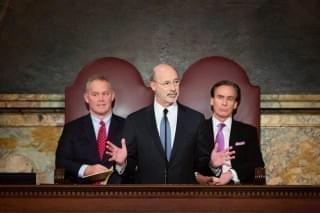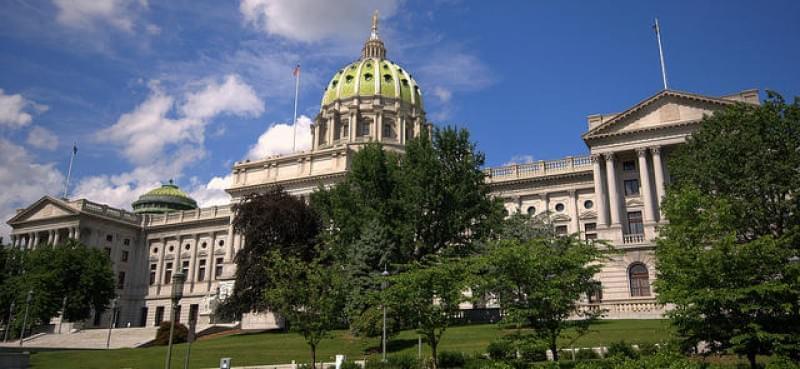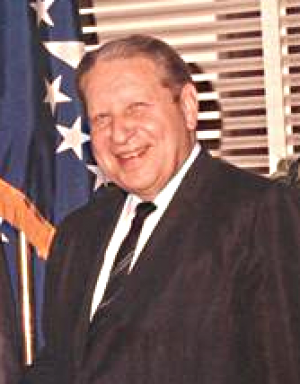Illinois Issues: Looking To Pennsylvania And Illinois’ Past To End Budget Impasse

An interior photo from the Pennsylvania Statehouse. Pennsylvania’s budget impasse recently ended, leaving Illinois as the last state in the nation without a budget for the current fiscal year. Flickr/Jim Bowen
Looking beyond our state’s borders and into Illinois’ past for a playbook to end the current budget standoff.
Commentary — Last November, disgruntled voters in a Rust Belt state beset by economic decline, budget shortfalls and pension woes, booted their incumbent governor — one of the least popular in the nation — out of office.
In his place, citizens chose a political neophyte, an Ivy League grad who’d never before run for public office and who promised to run the state like the businessman he was.
For better or worse, the same voters gave solid legislative majorities to the other political party, setting up a monumental test of wills culminating in a budget impasse, which left the state with no spending plan many months into the new budget year.
Sound familiar? Read on.
Finally, the governor decided the best interests of the folks who relied on the state for critical public services required him to set aside his agenda and allow the budget crafted by the legislative majorities to become law without his signature. Thus, the impasse ended after nine months, and both sides girded for a repeat heading into the next budget year.
Sadly, the foregoing account is not about Illinois. It’s not a look into a crystal ball that foresees an end to our current standoff. That stalemate is now more than three-quarters of the way through the budget year, with the state on track to post a $10 billion backlog of unpaid bills when Fiscal Year 2016 ends in a little more than two months.
Instead, the setting for the narrative is Pennsylvania, where the protagonists are a mirror image of Illinois, with a Democratic governor and strong Republican majorities in both legislative chambers.
Gov. Tom Wolf, who graduated from Dartmouth College six years earlier than Illinois Gov. Bruce Rauner, defeated incumbent Republican Tom Corbett last November. At the same time, Republicans were winning majorities, which today stand at 30 to 19 (with one seat vacant) in the Senate and 119 to 85 in the House.
Unlike the Illinois stalemate, the Keystone impasse was pretty much all about the budget. Wolf wanted lawmakers to impose a severance tax on natural gas extraction to help pay for a substantial boost for education funding, but Republicans refused, instead sending him an unbalanced plan he rejected last summer. Wolf signed a partial budget in December but used his line-item veto to strike out key portions, including new school funding, hoping to force a compromise.
Republicans instead sent him a $6.6 billion package including money for K-12 education, but with no new revenues. After legislative Democrats, some of whom voted for the GOP bill, implored the governor not to veto the measure, Wolf consented.
“To allow us to move on from the problems that have plagued 2015-16, I am going to allow this bill to become law,” the governor tweeted, setting aside his push for the gas tax. With the addition of that $6.6 billion, the state’s total budget for the current fiscal year is about $30 billion.

Pennsylvania Gov. Tom Wolf presents his State of the State address. Wolf, a Democrat, wanted to increase taxes but couldn't get the support he needed from the Republican-controlled legislature in the state.
Later, Wolf added a disclaimer in a statement to the press: “Let’s be clear: the math in this budget does not work. Next fiscal year — that already has a $2 billion deficit — will now begin with an extra $300 million deficit. Ratings agencies and the Independent Fiscal Office have all agreed that we face a massive structural deficit. Left unaddressed, the deficit will force cuts to schools and human services, devastating credit downgrades that will cost taxpayers millions, and increase property taxes for our senior citizens. We must face this reality this year and balance our budget with real, sustainable revenues.”
Of course, here in Illinois we’d kill for a deficit of “just” $2.3 billion, roughly a quarter of what state Comptroller Leslie Munger projects this year’s red ink will total.
A good number of us also would be quite pleased if our governor were to likewise set aside his so-called “Turnaround Agenda” in the interests of reaching a budget deal with majority Democrats to end the current impasse in Illinois.
Why single out Rauner? From the governor’s perspective, the problem is House Speaker Michael Madigan, who Rauner contends has controlled the state for decades. That final point might be news to some, for example former Senate President James “Pate” Philip, the Wood Dale Republican who dominated the Senate from 1993 to 2003. It might also be news to Republican governors, from Jim Thompson to Jim Edgar to George Ryan, all of whom apparently managed to cleverly hide the Madigan strings controlling them. In fact, Democratic governors Rod Blagojevich and Pat Quinn fared much more poorly in dealing with the House speaker than their GOP predecessors, a point Madigan made quite clear in a rare, extended speech on the House floor earlier this month.
“Differences with governors is not something new to me,” the speaker noted. “Nor is it something that has prevented me from working with governor of both political parties for the good of the people of Illinois in passing state budgets.”
The Chicago Democrat pointed out that over more than 30 years, he’s worked with six governors, twice as many Republicans as Democrats, and had differences with all of them, including the Democrats.
“Many of you will recall the very strong differences I had with former Gov. Rod Blagojevich. However, we found a way to compromise. My record over the years is one of compromise,” Madigan said. “Every other governor I have worked with has negotiated with the General Assembly in good faith. The fact is, the current budget crisis was completely avoidable. While this crisis was avoidable, Gov. Rauner has refused to put an end to the crisis.”
Madigan’s recollection of state history is accurate. In fact, since its statehood in 1818, Illinois has never gone this deep into a fiscal year without an enacted budget. Today, it’s instead running on autopilot fueled by statutorily mandated spending, consent decrees and court orders. Last week, rank and file legislators were able to come to a bipartisan agreement to partially fund the state’s universities, community colleges and MAP grants for low-income students.
The move was a good first step and an indication that lawmakers are tiring of the impasse and may be willing to try to work together to end it. But for most universities the legislation would amount to a roughly 70 percent cut in state operating funds for the current fiscal year — if it turns out to be all the money they receive and not the emergency stopgap measure sponsors have said they intend it to be. A host of human service programs serving folks with arguably the greatest needs, but the softest voices, in the political war of words, are still not getting funding for the current fiscal year.
And rarely being discussed are other bills the state isn’t paying for basic operations. In some instances, the consequences seem relatively minor; for example, an express driver services facility in Wheaton was shuttered last month because the state wasn't paying rent, and state parks in central Illinois and in the Metro East closed in recent days after utility companies shut off electrical service to the deadbeat state. But what calamity might ensue, for example, if the folks who provide food for the 46,000 or so inmates in Illinois prisons decide to stop extending the state credit?
In his floor speech, Madigan quoted from comments then candidate Rauner made in 2013, explaining to a partisan crowd how he could drive a wedge in Democratic ranks by throttling human service providers, forcing Democrats to forsake their labor allies to protect the frail elderly, the homeless, abused children, and others among society’s most disadvantaged. Shutting down state government might be needed, Rauner told the partisans, and he was ready to do so.

Pennsylvania’s impasse ended when, at the urging of lawmakers from his own party, Democratic Gov. Tom Wolf allowed a Republican-backed spending bill to become law.
Flickr/Jim Bowen
But assume for the sake of argument that Rauner’s comments were typical partisan campaign rhetoric, not a cynical strategy to leverage other people’s suffering to get his union-busting way. Assume, too, that Madigan’s wrong and Rauner really, truly wants to stop the rhetorical hand wringing and actually negotiate a deal.
If so, someone needs to tell the governor he’s probably not going about it the right way. For starters, one has to look for areas where common ground can be found to work something out, rather than insist on items upon which the other side will never yield. So in this case, governor, put aside for now all the anti-union poison pills and focus on what’s a lot more doable, for example reforms in workers’ compensation and personal injury lawsuit protocols, both of which would yield much more immediate benefit to the state’s business climate than limiting lawmakers terms starting in 2027, or changing how legislative district boundaries are drawn in 2023.
Another point that seems self-evident: stop publicly bad-mouthing the folks with whom you ultimately have to reach agreement. Suggesting that Madigan or his counterpart Senate President John Cullerton are corrupt, self-enriching politicians, for example, is probably counterproductive.
And perhaps most important, don’t burn the bridges you’ll have to cross before you get to them. Case in point, Rauner’s incessant rant that all Democrats want to do is force a major tax hike on Illinois citizens, something he won’t allow — at least until he gets his Turnaround Agenda.
The difficult truth is that Illinois has no hope of digging itself out of the hole in which it finds itself without new revenues. A major contributor to the current calamity has been the 2015 rollback of the 2011 increase in income tax rates, a rollback Rauner asked for.
Virtually everyone who’s taken a serious look at state finances knows tax increases are coming. A smarter approach would be to try to prepare the public for the inevitable by shifting from campaign mode, which has basically been the governor’s modus operandi since he started running for governor three years ago, to governing mode. Instead of trying to score partisan points by suggesting all Democrats want is higher taxes, start educating voters that all the goods and services they tell pollsters again and again that they want, have price tags. And right now, Illinois doesn’t have enough in its checking account to pay the bill.
Rounding up enough votes for bipartisan roll calls in the Senate and in the House to increase income tax rates and expand the sales tax base to certain services won’t be an easy task in any case, even though at this writing sizeable majorities in both chambers face no opposition in November. So why make it more difficult by making a partisan issue out of what essentially is a public policy necessity?

Former Illinois Gov. Sam Shapiro
Probably the best example of such smart looking ahead dates back almost 50 years, to the election for governor in 1968. Illinois was then enduring tough fiscal times, as it had through much of the 1960s, and speculation ran high that enactment of a state income tax might be in the cards in 1969.
The campaign that year would have been a perfect opportunity for either gubernatorial candidate — Democratic incumbent Sam Shapiro or Republican challenger Richard B. Ogilvie — to score cheap points by accusing the other of planning to push for the controversial tax.

Former Gov. Richard B. Ogilvie
To their credit — but to the amazement of no one who knew the integrity of both candidates — neither raised the issue, because both knew that whomever voters chose that November would have no other choice but to call for an income tax. Neither wanted to poison the well.
We’re in the same place today. Stopgap funding can provide relief and keep institutions like Chicago State University from closing down entirely. But the impasse will not end until there is a full budget plan for the current fiscal year and the next — and putting that together is nearly impossible without new revenues. Rauner has remained fairly quiet over the past week and has, for a few days at least, refrained from bashing Democratic leaders or a tax increase — would that he take a page from the 1968 playbook and continue that restraint.
Charles N. Wheeler III is director of the Public Affairs Reporting program at the University of Illinois Springfield.
Illinois Issues is in-depth reporting and analysis that takes you beyond the headlines to provide a deeper understanding of our state. Illinois Issues is produced by NPR Illinois in Springfield.
